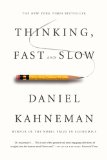Summary | Excerpt | Reviews | Beyond the Book | Readalikes | Genres & Themes | Author Bio

Critics' Opinion:
Readers' Opinion:
First Published:
Oct 2011, 512 pages
Paperback:
Apr 2013, 512 pages
 Book Reviewed by:
Book Reviewed by:
Beverly Melven
Buy This Book
In rough order of complexity, here are some examples of the automatic activities that are attributed to System 1:
All these mental events belong with the angry woman - they occur automatically and require little or no effort. The capabilities of System 1 include innate skills that we share with other animals. We are born prepared to perceive the world around us, recognize objects, orient attention, avoid losses, and fear spiders. Other mental activities become fast and automatic through prolonged practice. System 1 has learned associations between ideas (the capital of France?); it has also learned skills such as reading and understanding nuances of social situations. Some skills, such as finding strong chess moves, are acquired only by specialized experts. Others are widely shared. Detecting the similarity of a personality sketch to an occupational stereotype requires broad knowledge of the language and the culture, which most of us possess. The knowledge is stored in memory and accessed without intention and without effort.
Several of the mental actions in the list are completely involuntary. You cannot refrain from understanding simple sentences in your own language or from orienting to a loud unexpected sound, nor can you prevent yourself from knowing that 2 + 2 = 4 or from thinking of Paris when the capital of France is mentioned. Other activities, such as chewing, are susceptible to voluntary control but normally run on automatic pilot. The control of attention is shared by the two systems. Orienting to a loud sound is normally an involuntary operation of System 1, which immediately mobilizes the voluntary attention of System 2. You may be able to resist turning toward the source of a loud and offensive comment at a crowded party, but even if your head does not move, your attention is initially directed to it, at least for a while. However, attention can be moved away from an unwanted focus, primarily by focusing intently on another target.
The highly diverse operations of System 2 have one feature in common: they require attention and are disrupted when attention is drawn away. Here are some examples:
In all these situations you must pay attention, and you will perform less well, or not at all, if you are not ready or if your attention is directed inappropriately. System 2 has some ability to change the way System 1 works, by programming the normally automatic functions of attention and memory. When waiting for a relative at a busy train station, for example, you can set yourself at will to look for a white-haired woman or a bearded man, and thereby increase the likelihood of detecting your relative from a distance. You can set your memory to search for capital cities that start with N or for French existentialist novels. And when you rent a car at London's Heathrow Airport, the attendant will probably remind you that "we drive on the left side of the road over here." In all these cases, you are asked to do something that does not come naturally, and you will find that the consistent maintenance of a set requires continuous exertion of at least some effort.
Thinking, Fast and Slow Copyright © 2011 by Daniel Kahneman





The Flower Sisters
by Michelle Collins Anderson
From the new Fannie Flagg of the Ozarks, a richly-woven story of family, forgiveness, and reinvention.

The House on Biscayne Bay
by Chanel Cleeton
As death stalks a gothic mansion in Miami, the lives of two women intertwine as the past and present collide.

The Funeral Cryer by Wenyan Lu
Debut novelist Wenyan Lu brings us this witty yet profound story about one woman's midlife reawakening in contemporary rural China.
Your guide toexceptional books
BookBrowse seeks out and recommends the best in contemporary fiction and nonfiction—books that not only engage and entertain but also deepen our understanding of ourselves and the world around us.